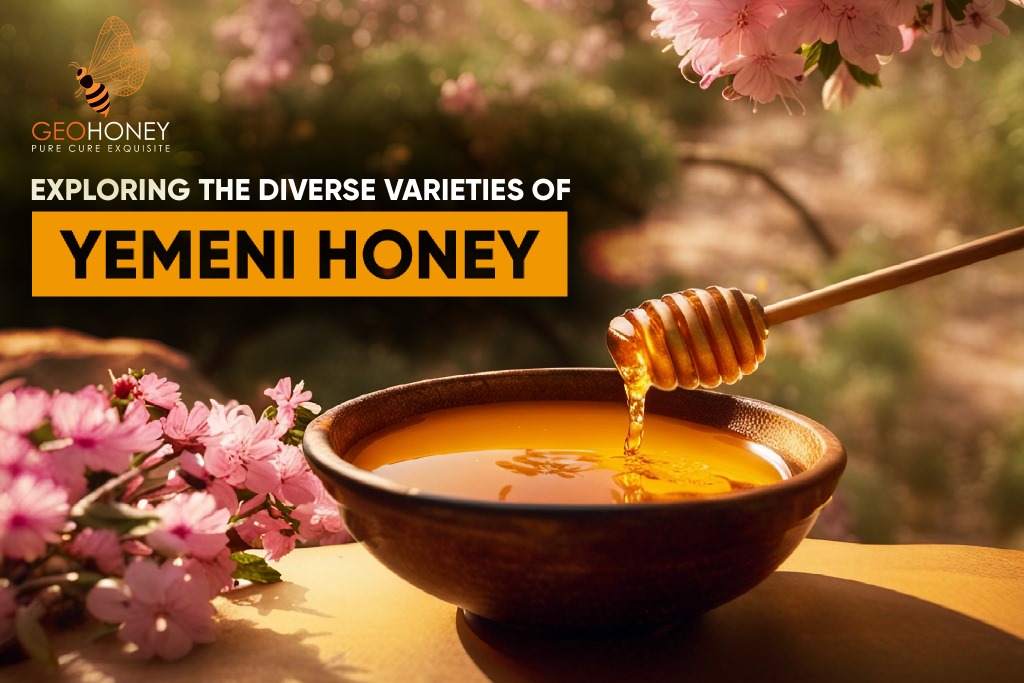- Tokyo: 04:04
- Singapore: 03:04
- Dubai: 23:04
- London: 20:04
- New York: 15:04
The Many Faces of Yemeni Honey: A Journey Through Its Different Varieties

Yemen is known for producing some of the best quality honey globally. Yemeni honey is unique due to the distinctive wilderness of Yemen's bee pastures, found in landscapes ranging from coastlines to mountains, highlands, plains, valleys and deserts.
Yemeni honey is celebrated for its flavor and medicinal qualities. It is among the world's most popular and expensive honey varieties. With diverse types like Sidr, Sumar and Salam honey. It offers unique features based on its constituents, beekeeping areas and feeding trees. In this blog, we will explore the varieties of Yemeni honey, their features and the role of the Sidr tree in the production.
What Are The Different Varieties Of Yemeni Honey And Their Features
Yemeni honey comes in numerous varieties, each with its features and benefits based on the trees it feeds. The most popular Yemeni honey types include:
Sidr Honey: This organic honey type is considered one of the finest and most expensive types of honey globally. It is extracted from the blossoms of the Sidr tree, delivering pale-colored honey with a bitter aftertaste. Sidr honey is widely used in the Arab Gulf countries due to its medicinal and therapeutic benefits.
Sumar Honey: This honey type got its name after the Sumar tree found in the Hadramout region, which is the primary source of nectar for bees. It is the most popular variety of Yemeni honey and offers a caramel taste without being excessively sweet.
Yemeni Sidr Doani: Harvested from Sidr trees in the Doan Valley, Yemen, it boasts a dark amber color, thick consistency, and a rich, caramel-like flavor with a floral aroma. Locally it is also known as mountain honey.
Yemeni Sidr Wasabi: Sourced from Sidr trees in the Wasabi region, it has a lighter hue, smooth texture, and a delicate, floral taste with hints of citrus and herbs—perfect for gourmet use.
Yemeni Sidr Usami: Derived from Sidr trees in the Usamah region, it showcases a golden color, velvety texture, and a sweet, fruity flavor with berry notes and a subtle floral scent.
The Role of The Sidr Tree In The Production Of Yemeni Honey
The Sidr tree plays a crucial role in the production of Yemeni honey. Some of the ways the Sidr tree affects the production of Yemeni honey include:
Nectar Source: Sidr honey is made from the nectar of the Sidr tree, which only grows in certain parts of Yemen. The Sidr tree produces very sweet nectar that is made into honey by bees. The nectar produced inside the flowers is extremely potent and full of nutritional value, which contributes to the medicinal qualities of the honey.
Unique Climate and Soil: The unique climate and soil in Yemen create the perfect environment for Sidr trees to thrive and produce some of the finest honey in the world. The Sidr trees grow uncultivated in the desolated areas of Yemen, untouched by chemicals, drugs, or modern machinery.
Medicinal Properties: Sidr honey is considered sacred honey and is used to treat many diseases. Both fresh and dried Sidr leaves have been used internally and externally by the Arabs for thousands of years for their medical and disease-curing benefits.
Prevents Crystallization: Sidr honey does not granulate because its high fructose content prevents crystallization. The natural sugars in the honey are balanced by a high level of glucose, which also helps to prevent granulation.
Harvesting: Sidr honey is harvested only in the winter season using traditional methods and manual labor. No pesticides, chemicals, or artificial feeding are used in the production of Sidr honey.
Yemeni honey production has been impacted by factors such as climate change, drought, and the destruction of bee habitats. Despite these challenges, Yemeni beekeepers are fighting to keep their famed honey flowing.
Conclusion
Yemeni honey offers a diverse range of varieties with unique features and benefits. From the highly prized Sidr honey to the rare Cave honey, Yemeni beekeepers utilize traditional methods to produce honey naturally. The Sidr tree plays a crucial role, providing sweet nectar for honey production.
Each jar of Yemeni honey represents the dedication and perseverance of Yemeni beekeepers, who overcome numerous obstacles to bring this golden elixir to your table. By purchasing Yemeni honey from Geohoney, you not only experience the rich and unique flavors but also support the sustainable practices employed by local beekeepers.



